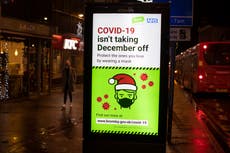Coronavirus: Freight crisis as new strain leads France and European neighbours to ban travel from UK
Calls for Boris Johnson to extend Brexit transition period amid border chaos
Your support helps us to tell the story
From reproductive rights to climate change to Big Tech, The Independent is on the ground when the story is developing. Whether it's investigating the financials of Elon Musk's pro-Trump PAC or producing our latest documentary, 'The A Word', which shines a light on the American women fighting for reproductive rights, we know how important it is to parse out the facts from the messaging.
At such a critical moment in US history, we need reporters on the ground. Your donation allows us to keep sending journalists to speak to both sides of the story.
The Independent is trusted by Americans across the entire political spectrum. And unlike many other quality news outlets, we choose not to lock Americans out of our reporting and analysis with paywalls. We believe quality journalism should be available to everyone, paid for by those who can afford it.
Your support makes all the difference.The UK faced a freight crisis as Christmas week dawned, after France and other European countries locked down their borders in a bid to prevent the spread of a new, virulent strain of Covid-19.
Businesses feared drivers would be stranded in Britain, and that goods would be blocked from either leaving or entering – causing food shortages and potentially forcing them to close.
The disruption caused to businesses has led the SNP and the Liberal Democrats to urge the prime minister to extend the negotiation period, with Nicola Sturgeon saying it would “unconscionable” for him to “compound” the UK’s current coronavirus woes with Brexit.
After Boris Johnson imposed strict tier 4 coronavirus restrictions on London and southeast England on Saturday, the UK's neighbours responded by banning British travellers from crossing their borders for fear that the novel virus variant would spread. Matt Hancock, the health secretary, admitted on Sunday it was “out of control” within the UK.
France’s block will last for at least 48 hours and has forced Dover’s ferry port and the Eurotunnel to close to traffic leaving Britain. Germany, Ireland, Austria, the Netherlands, Italy and Belgium also have restrictions in place; late on Sunday Saudi Arabia reportedly announced its own crackdown.
It left Westminster scrambling on Sunday night. A No 10 spokesperson said: “The prime minister will chair a Cobra meeting tomorrow to discuss the situation regarding international travel, in particular the steady flow of freight into and out of the UK.
“Further meetings are happening this evening and tomorrow morning to ensure robust plans are in place.”
Grant Shapps, the transport secretary, urged the public and hauliers to avoid driving to ports in Kent where he said ministers expected “significant disruption”. The government also advised hauliers and customers to delay the shipments of goods or seek alternative routes.
The Food and Drink Federation’s chief executive, Ian Wright, warned of possible food shortages as a result of the border closure.
He said: “Tonight’s suspension of accompanied freight traffic from the UK to France has the potential to cause serious disruption to UK Christmas fresh food supplies – and exports of UK food and drink.
“Continental truckers will not want to travel here if they have a real fear of getting marooned. The government must very urgently persuade the French government to exempt accompanied freight from its ban.”
Retailers also demanded a rapid resolution to the escalating chaos. “This is a key supply route for fresh produce at this time of year: the channel crossings see 10,000 trucks passing daily during peak periods such as in the run up to Christmas,” said Andrew Opie, director of food and sustainability at the British Retail Consortium.
“We urge the UK government and the EU to find a pragmatic solution to this as soon as possible, to prevent disruption for consumers.”
Immediate shortages should be averted because shops have stocked up on goods ahead of Christmas, he said.
“However, any prolonged closure of the French border would be a problem as the UK enters the final weeks before the transition ends on 31 December,” he added.
“Shoppers should not panic buy," said Alex Veitch, general manager at Logistics UK. "Retailers will be making every effort to ensure there is stock within the system, including fresh produce, and it is important that we remember that inbound traffic still has access to the UK.
“We are maintaining close contact with UK government to ensure that supplies of fresh produce are available throughout Christmas and the New Year.”
Logistics UK said it was urgently seeking more information from its members to ensure drivers are safe.
Shortly after midnight on Monday morning, Kent Police tweeted that it would implement Operation Stack, a procedure that allows lorries to form queues along part of the M20, in order to avoid gridlock in the county.
Labour's shadow minister for the Cabinet Office, Rachel Reeves MP, said the closure of trade routes to mainland Europe was “deeply worrying”.
She added: “The country needs to hear credible plans and reassurance that essential supplies will be safeguarded, including our NHS, supermarkets and manufacturers with crucial supply chains.
“We cannot afford the same slowness this government has displayed throughout this pandemic. The prime minister must urgently explain what he is doing to get a grip on the situation.”
The spread of the new Covid-19 strain saw Britain record its highest ever one-day rise in infections on Sunday, with 35,928.
Mr Hancock has suggested that because of the threat, parts of England could remain under tier 4 restrictions for months, until a large proportion of the population has been vaccinated.





Join our commenting forum
Join thought-provoking conversations, follow other Independent readers and see their replies
Comments